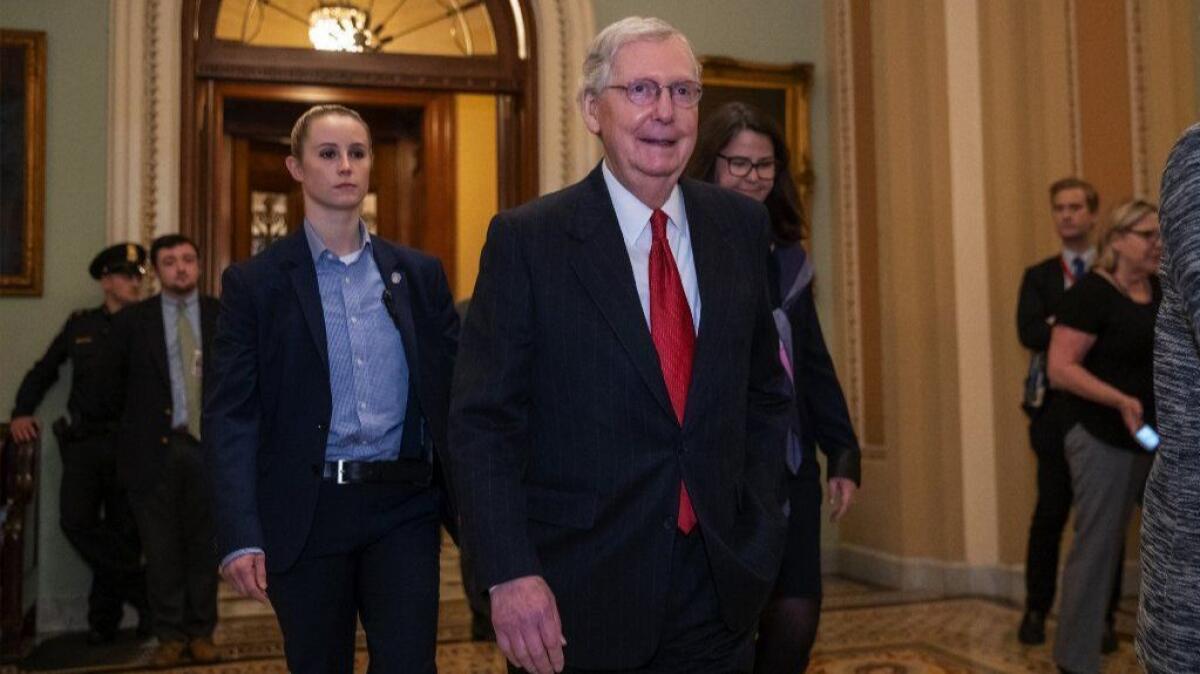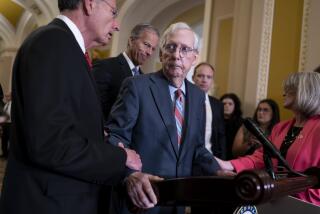McConnell uses his control of the Senate to put pressure on 2020 Democratic candidates

Reporting from Washington — With nearly one in five Democratic senators now eyeing the White House, Senate Majority Leader Mitch McConnell (R-Ky.) is using his control over the chamber to make life a little more difficult for President Trump’s 2020 challengers.
On Monday, McConnell — the top Republican in the GOP-controlled Senate — forced a vote on a controversial anti-abortion bill. It has no hope for passage but it required some Democrats to take an uncomfortable vote that will almost certainly be used against them during the campaign.
For the record:
6:55 a.m. Feb. 26, 2019An earlier version of this story said Sen. McConnell had not specified what his Green New Deal measure would include, but it would likely be a nonbinding resolution. McConnell’s office had said it would be a binding resolution.
Next, McConnell has teed up a vote soon on a sweeping climate change plan called the Green New Deal. Though most Democrats support stronger environmental protections and McConnell definitely does not, he’s bringing up a binding resolution to highlight some of the Democrats’ most extreme ideas, hoping to draw out divisions between progressives and moderates.
The votes are among several McConnell is expected to force this year on high-profile issues, including Medicare for All, which has also fractured Democrats.
“When you have that high a number of U.S. senators who are in a Democratic primary for president, obviously you can cut a pretty wide swath through the field by simply forcing them to take a position on an issue,” said Josh Holmes, McConnell’s former chief of staff and political advisor.
2020 Democratic presidential candidates: Who’s in and who’s on the fence? »
“I don’t anticipate McConnell will turn the Senate into a campaign studio, but if there are things like the Green New Deal — where you have four, five, six senators running for president who have endorsed it — it could get serious,” Holmes said.
The Kentuckian’s control over the Senate calendar is another lever at his disposal. That means he could keep the Senate in session instead of going into recess, forcing the nine Democratic senators who have announced 2020 campaigns, or are considering it, to choose between the campaign trail and their congressional duties.
Democrats take a cynical view of McConnell’s motives.
McConnell is “just trying to screw with Democrats,” said Sen. Chris Murphy (D-Conn.), who has expressly said he won’t seek the nomination in 2020.
Senate votes can have significant consequences on a candidate’s presidential ambitions. Then-Sen. Hillary Clinton’s support for the Iraq war was an albatross on her primary campaign against then-Sen. Barack Obama.
Murphy and other Democratic lawmakers said the party is strategizing over how to handle the Green New Deal vote and the others like it. They hope to use the environmental vote to remind voters of the GOP’s resistance to bringing up any climate change legislation, other than one McConnell knows will fail.
One option is for Democrats to vote “present” instead of in support or opposition, effectively neutering the vote. In 2017, when Republicans tried to force a vote on Sen. Bernie Sanders’ (I-Vt.) Medicare for All plan, nearly all the Democrats banded together to vote “present” instead of showing party divisions.
“I think there’s a lot of us talking about what to do on this,” said Sen. Cory Booker (D-N.J.), one of the Democrats who has announced his candidacy.
He didn’t commit to voting for the environmental proposal, which is popular with progressives but whose details remain unclear.
Booker declined to criticize McConnell for bringing up the issue. “I don’t know what the motivation is. I don’t know if it has to do with the politics of the trail or — I don’t know,” Booker said of the upcoming vote. “You take every vote as they come. You vote your heart and your head.”
Other Democrats said they were eager to show their support for an idea that could differentiate the increasingly crowded Democratic primary field.
“I don’t know what [McConnell’s] intentions are exactly,” said Sen. Kamala Harris (D-Calif.). “But I’m in favor of it,” she said of the Green New Deal.
Some Democrats could even find it helpful to be one of the few in their party to vote against a progressive priority. Sens. Amy Klobuchar (D-Minn.), who has announced her candidacy and is positioning herself as a moderate, and Sherrod Brown (D-Ohio), who is considering a run, have expressed skepticism about Medicare for All. A high-profile Senate vote on Medicare for All could boost their moderate bona fides and give them an opportunity to talk about incremental healthcare expansion ideas, such as allowing people to buy into the program before they turn 65 years old.
Republicans say the tough Senate votes will prevent Democrats from trying to have it both ways: talking positively about Medicare for All in general, but then refusing to get into specifics or actually vote on the issue. As proposed by Sanders, Medicare for All would replace current employer-provided health coverage with a government-run system for everyone.
A vote on the Green New Deal “demonstrates how wacky and out of the mainstream the other party is becoming,” said Sen. John Cornyn (R-Texas).
On Monday, the Senate voted on a bill that would require physicians to provide medical care to a baby born during an attempted abortion. A 17-year-old federal law already requires that an infant born after an attempted abortion must be treated as a person.
Opponents of abortion say that’s not enough; they want to make it criminal to not provide treatment. Abortion rights supporters say it is redundant. But those votes leave the 2020 Democratic candidates open to GOP attack ads claiming they refused to vote for a bill to protect newborn babies.
All of them voted with most other Democrats in opposing the bill during Monday’s procedural vote, which failed to reach the 60 votes needed to avoid a filibuster. The vote was 53-44.
The GOP measure came after high-profile remarks from Democratic Virginia Gov. Ralph Northam, who said a baby born after an attempted abortion would be kept “comfortable” and only be resuscitated “if that’s what the mother and the family desired.” Trump and other Republicans portrayed Northam’s comments as support for “infanticide.”
McConnell will have to play defense this year as well. He’ll have to navigate his Republican members around a vote next month on whether to block Trump’s emergency declaration on the border wall. The measure is expected to be approved by the House on Tuesday and because of procedural rules, he won’t be able to block it from coming up in the Senate.
He will, however, be able to prevent Senate votes on other Democratic-backed bills that are expected to pass the House, such as a comprehensive background check bill for gun buyers, and a campaign finance and elections reform bill, which McConnell has already dubbed a “Democrat Politician Protection Act.”
Presidential politics have bled into Senate business in the past. In 2008, when several Democratic senators pursued the nomination, then-Sen. Obama was criticized for skipping Senate votes in favor of campaigning.
Some Democrats doubt that a single vote — particularly one ginned up by the opposition party such as on the Green New Deal — has enough staying power to derail a campaign in today’s fast-paced news cycle.
“This is the kind of thing that may have worked in the ’80s and ’90s,” said Sen. Brian Schatz (D-Hawaii). Voters “know what they want and they aren’t going to be tricked by a parliamentary move. I know people on the Hill are always admiring some kind of ‘trickery,’ but people in the world do not admire trickery. They hate it.”
Sen. Richard J. Durbin of Illinois, another Democrat who has said he won’t enter the 2020 contest, noted that McConnell’s moves are nothing new.
“This is old school. He’s going to do it. We do it. Everybody does it,” he said. “It amuses some small-minded senators.”
McConnell also will have to balance his ability to interfere with the Democratic primary with his interest in preserving the Republican majority in the Senate. Twenty-two Republican-held seats are on the ballot in 2020, including two in states that Clinton won in 2016 — Colorado and Maine. Just like the Democratic senators, they will have to make the same difficult votes.
“They have a bigger problem,” Brown said of Republicans. “Every time he plays games, it potentially comes down on some of their senators in tough states where Hillary won.”
More stories from Jennifer Haberkorn »
More to Read
Get the L.A. Times Politics newsletter
Deeply reported insights into legislation, politics and policy from Sacramento, Washington and beyond. In your inbox three times per week.
You may occasionally receive promotional content from the Los Angeles Times.











